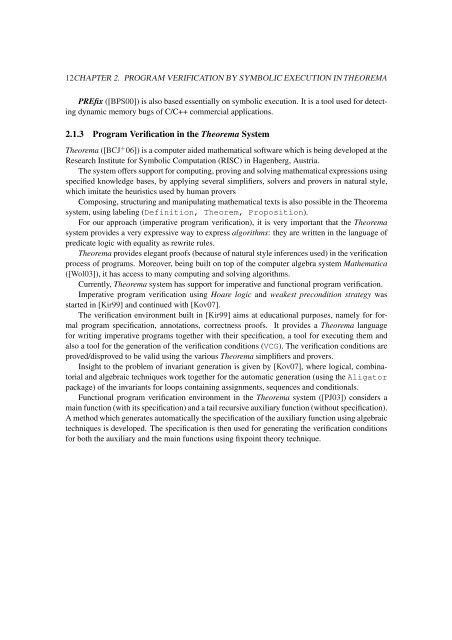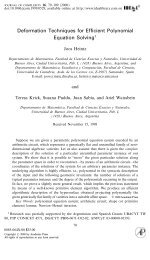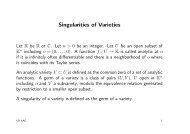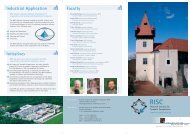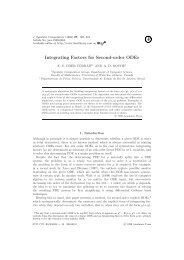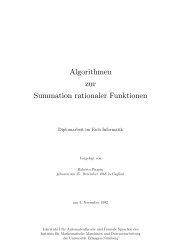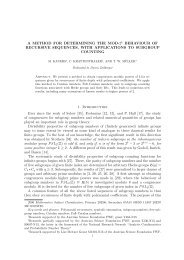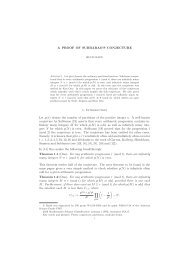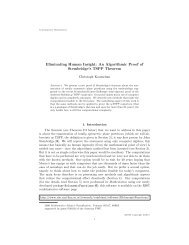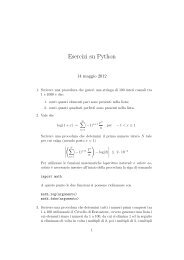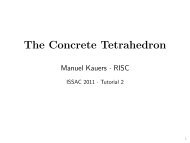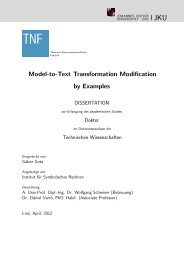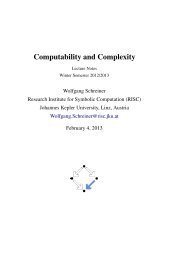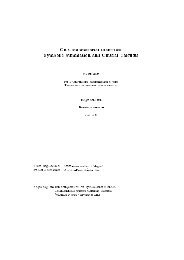Automated Formal Static Analysis and Retrieval of Source Code - JKU
Automated Formal Static Analysis and Retrieval of Source Code - JKU
Automated Formal Static Analysis and Retrieval of Source Code - JKU
Create successful ePaper yourself
Turn your PDF publications into a flip-book with our unique Google optimized e-Paper software.
12CHAPTER 2. PROGRAM VERIFICATION BY SYMBOLIC EXECUTION IN THEOREMA<br />
PREfix ([BPS00]) is also based essentially on symbolic execution. It is a tool used for detecting<br />
dynamic memory bugs <strong>of</strong> C/C++ commercial applications.<br />
2.1.3 Program Verification in the Theorema System<br />
Theorema ([BCJ + 06]) is a computer aided mathematical s<strong>of</strong>tware which is being developed at the<br />
Research Institute for Symbolic Computation (RISC) in Hagenberg, Austria.<br />
The system <strong>of</strong>fers support for computing, proving <strong>and</strong> solving mathematical expressions using<br />
specified knowledge bases, by applying several simplifiers, solvers <strong>and</strong> provers in natural style,<br />
which imitate the heuristics used by human provers<br />
Composing, structuring <strong>and</strong> manipulating mathematical texts is also possible in the Theorema<br />
system, using labeling (Definition, Theorem, Proposition).<br />
For our approach (imperative program verification), it is very important that the Theorema<br />
system provides a very expressive way to express algorithms: they are written in the language <strong>of</strong><br />
predicate logic with equality as rewrite rules.<br />
Theorema provides elegant pro<strong>of</strong>s (because <strong>of</strong> natural style inferences used) in the verification<br />
process <strong>of</strong> programs. Moreover, being built on top <strong>of</strong> the computer algebra system Mathematica<br />
([Wol03]), it has access to many computing <strong>and</strong> solving algorithms.<br />
Currently, Theorema system has support for imperative <strong>and</strong> functional program verification.<br />
Imperative program verification using Hoare logic <strong>and</strong> weakest precondition strategy was<br />
started in [Kir99] <strong>and</strong> continued with [Kov07].<br />
The verification environment built in [Kir99] aims at educational purposes, namely for formal<br />
program specification, annotations, correctness pro<strong>of</strong>s. It provides a Theorema language<br />
for writing imperative programs together with their specification, a tool for executing them <strong>and</strong><br />
also a tool for the generation <strong>of</strong> the verification conditions (VCG). The verification conditions are<br />
proved/disproved to be valid using the various Theorema simplifiers <strong>and</strong> provers.<br />
Insight to the problem <strong>of</strong> invariant generation is given by [Kov07], where logical, combinatorial<br />
<strong>and</strong> algebraic techniques work together for the automatic generation (using the Aligator<br />
package) <strong>of</strong> the invariants for loops containing assignments, sequences <strong>and</strong> conditionals.<br />
Functional program verification environment in the Theorema system ([PJ03]) considers a<br />
main function (with its specification) <strong>and</strong> a tail recursive auxiliary function (without specification).<br />
A method which generates automatically the specification <strong>of</strong> the auxiliary function using algebraic<br />
techniques is developed. The specification is then used for generating the verification conditions<br />
for both the auxiliary <strong>and</strong> the main functions using fixpoint theory technique.


